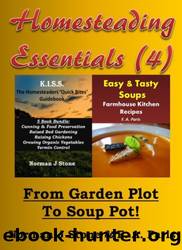Homesteading Essentials by Norman J Stone & F. A. Paris

Author:Norman J Stone & F. A. Paris [Stone, Norman J & Paris, F. A.]
Language: eng
Format: epub
Tags: Cookbooks; Food & Wine, Quick & Easy, Crafts; Hobbies & Home, Sustainable Living
Amazon: B00J12A7JC
Publisher: Deanburn Publications
Published: 2014-03-14T04:00:00+00:00
When you grow vegetables organically and are applying proper methods of fertilizing, rotational growing etc; then the soil is kept healthy and able to grow great crops without the use of any chemicals â now that has to be a result!
Composting:
This is something that you must think about long before you need the compost, in most cases a year at least. Your vegetable plot or raised bed (even better), needs compost that is well rotted and crumbly to the feel. If it is still smelly then it is probably not ready for the garden yet. The process of making your own compost is simple enough, as it is basically a load of organic material such as vegetable trimmings, grass cuttings, fallen leaves etc, that are dumped into a bin or wooden framework and left to decompose. Thatâs the simple answer; however there are certain things that you should not add to a compost heap such as..
Inorganic material: Plastic and polythene will not break down to form compost. Obvious I know, but it had to be said!
Pet Poop: Never add dog or cat droppings to the compost heap, as this can add several disease organisms that can turn your compost toxic.
Fish, fats, meat, bones and dairy: These should not be added as they can just attract vermin, and cause your compost to smell badly.
Coal ash: timber ash is fine for compost, but coal ash is not as it can add high levels of sulphur to your compost.
Coloured paper: Coloured paper can contain heavy metals and other toxic materials. These should not be added to your compost.
Diseased plants: Any diseased or infested plants that you have to lift up should be burned or otherwise disposed of. Do not add to the compost as they will most likely end up back in your garden to repeat the cycle all over again!
Download
This site does not store any files on its server. We only index and link to content provided by other sites. Please contact the content providers to delete copyright contents if any and email us, we'll remove relevant links or contents immediately.
| Automotive | Engineering |
| Transportation |
Whiskies Galore by Ian Buxton(41963)
Introduction to Aircraft Design (Cambridge Aerospace Series) by John P. Fielding(33102)
Small Unmanned Fixed-wing Aircraft Design by Andrew J. Keane Andras Sobester James P. Scanlan & András Sóbester & James P. Scanlan(32775)
Craft Beer for the Homebrewer by Michael Agnew(18218)
Turbulence by E. J. Noyes(8001)
The Complete Stick Figure Physics Tutorials by Allen Sarah(7349)
Kaplan MCAT General Chemistry Review by Kaplan(6913)
The Thirst by Nesbo Jo(6905)
Bad Blood by John Carreyrou(6597)
Modelling of Convective Heat and Mass Transfer in Rotating Flows by Igor V. Shevchuk(6419)
Learning SQL by Alan Beaulieu(6260)
Weapons of Math Destruction by Cathy O'Neil(6243)
Man-made Catastrophes and Risk Information Concealment by Dmitry Chernov & Didier Sornette(5977)
Digital Minimalism by Cal Newport;(5733)
Life 3.0: Being Human in the Age of Artificial Intelligence by Tegmark Max(5532)
iGen by Jean M. Twenge(5397)
Secrets of Antigravity Propulsion: Tesla, UFOs, and Classified Aerospace Technology by Ph.D. Paul A. Laviolette(5356)
Design of Trajectory Optimization Approach for Space Maneuver Vehicle Skip Entry Problems by Runqi Chai & Al Savvaris & Antonios Tsourdos & Senchun Chai(5051)
Pale Blue Dot by Carl Sagan(4981)
